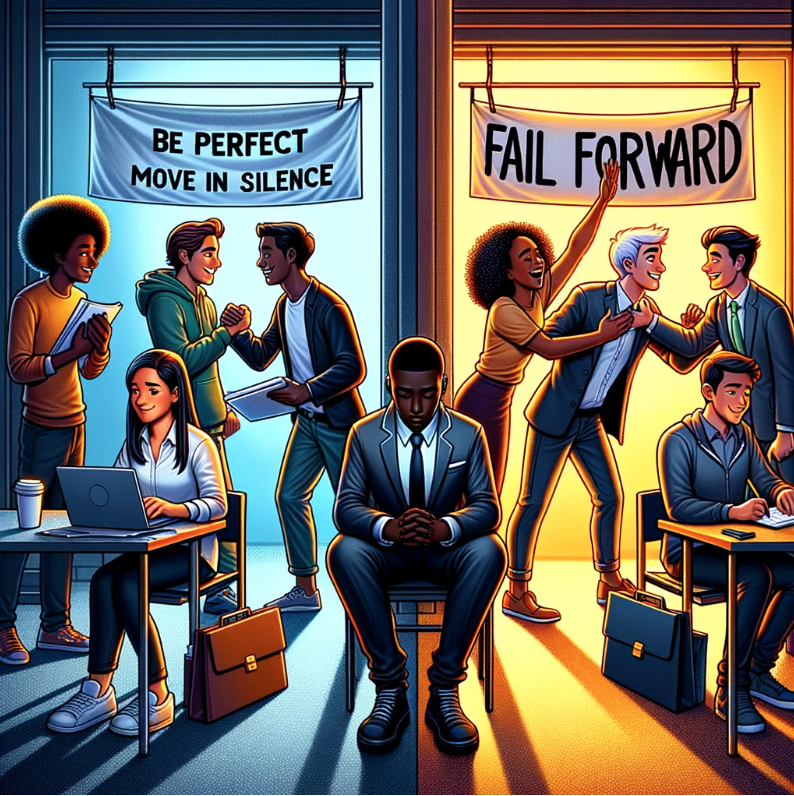[et_pb_section fb_built=”1″ _builder_version=”4.16″ custom_padding=”0px|||||” global_colors_info=”{}”][et_pb_row _builder_version=”4.16″ background_size=”initial” background_position=”top_left” background_repeat=”repeat” global_colors_info=”{}”][et_pb_column type=”4_4″ _builder_version=”4.16″ custom_padding=”|||” global_colors_info=”{}” custom_padding__hover=”|||”][et_pb_text _builder_version=”4.27.2″ background_size=”initial” background_position=”top_left” background_repeat=”repeat” global_colors_info=”{}”]
 Being Black, biracial, and leaning more toward “white-presenting” in appearance, I’ve often navigated assumptions from all sides. My introduction to business came from my European father and his long-time broker – people who were trusted and whose networks opened doors. With them, I experienced a taste of “white privilege,” witnessing firsthand how those who appear to ‘belong’ are received differently in the business world. But when my father passed, I began to see just how much skin tone and network shape opportunity. I don’t see myself as white because I’m not, yet I’m often accused of thinking I’m “something I’m not.” It’s a reminder of how Black people who don’t “look Black enough” end up having to prove themselves on both sides. This became clearest when my fortunes waned, and I sought support as a Black man in business.
Being Black, biracial, and leaning more toward “white-presenting” in appearance, I’ve often navigated assumptions from all sides. My introduction to business came from my European father and his long-time broker – people who were trusted and whose networks opened doors. With them, I experienced a taste of “white privilege,” witnessing firsthand how those who appear to ‘belong’ are received differently in the business world. But when my father passed, I began to see just how much skin tone and network shape opportunity. I don’t see myself as white because I’m not, yet I’m often accused of thinking I’m “something I’m not.” It’s a reminder of how Black people who don’t “look Black enough” end up having to prove themselves on both sides. This became clearest when my fortunes waned, and I sought support as a Black man in business.
The Reality of Business in a Racialized World
In my twenties, I had the privilege of being offered a chance to take my barely-existent business public – an opportunity almost unimaginable for most Black entrepreneurs. Yet, only a few years later, I struggled to even get my social network idea heard, despite it being years ahead of Facebook. Black “leaders” in Springfield, MA, dismissed the idea outright, perhaps judging me through their own biases, unable to see me succeeding in a new, untested industry. Years later, those same individuals admitted, “You were right about that internet thing, those white boys in Northampton sold their business for millions and KEPT their jobs!” They finally saw what I’d been advocating all along.
The Double Standard
The messages given to white entrepreneurs versus those directed at BIPOC individuals reveal stark differences:
- For white men: It’s all about sharing ideas, building alliances, and taking risks. Concepts like “failing forward” and “burn rates” are embraced as natural parts of business.
- For Black men: The advice becomes drastically different. We’re told to move in silence, rely solely on our own resources, and avoid anything untested. We’re expected to be twice as good, maintain perfect credit, keep substantial collateral, and show “healthy revenue streams” from day one – as if any small misstep would collapse everything.
Internalized Barriers
The reality is, we start to internalize these limiting beliefs. This “wisdom” teaches Black individuals to approach business cautiously and alone, instead of with the expansive mindset that truly fuels success. By stifling collaboration, risk-taking, and transparency, these barriers keep opportunities perpetually out of reach.
The Right Approach for Everyone
Real success doesn’t thrive in silence or isolation, nor does it grow from perfectionism. Here’s what I believe we need to encourage for all entrepreneurs, regardless of background:
- Embrace setbacks as learning opportunities, not failures.
- Take calculated risks – there’s no need to be flawless.
- Seek support boldly – asking for help shows strength.
- Cultivate resilience by focusing on progress over perfection.
- Leverage diverse networks – varied perspectives fuel the best ideas.
It’s time to break free of these limiting narratives and embrace a new approach that empowers every entrepreneur, fully and fearlessly.
[/et_pb_text][/et_pb_column][/et_pb_row][/et_pb_section]